![]()
The Words of the Glass Family
|
|
The Words of the Glass Family |
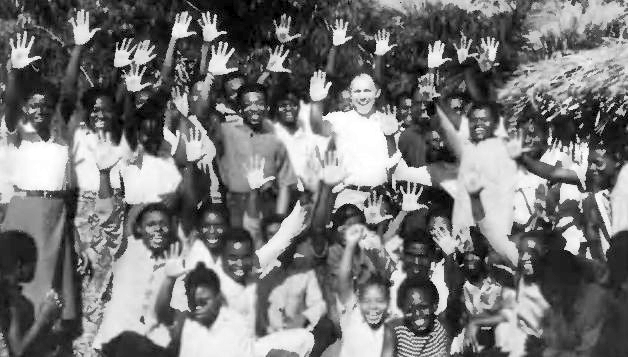
Papa
Kayembe (second from right, back row), George Glass, and staff
members at farm project near Kinkole, Zaire.
In May and June 1985 I visited Africa for the second time, the first having been in September 1984, when I taught the 40-day training in Nigeria. This time I spent six weeks traveling through Zambia, Kenya, Uganda, Zaire, and the Ivory Coast, visiting missionaries and members on behalf of Rev. Chung Hwan Kwak.
In spite of all the films, documentaries, photos, and articles we in the rest of the world have seen and read concerning Africa, I wonder if we can truly grasp the immensity, natural beauty, and potential wealth of this continent -- to say nothing of the industriousness of the African peoples.
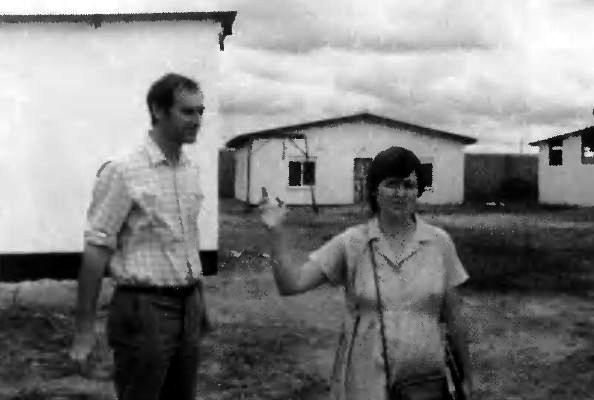
Dr.
Colette Takigawa explains to Rudolf Faerber and others what each of
the buildings at Twikitane Clinic in Zambia will be used for when it
is completed.
The image so often presented to us of Africa is that of a continent covered with either dense tropical rain forest, or arid Saharan or Sahelian desert, or endless plains -- all, of course, teaming with countless bizarre insects and ferocious animals.
Interestingly for me, the lands to which I traveled this time reminded me of various parts of America: Zambia of Northern California, Kenya and Eastern Zaire of Colorado, and the Ivory Coast of the Louisiana coast. In its natural beauty, however, Uganda stands alone, sitting as it does squarely on the equator 1500 meters and more above sea level, and bounded by Lake Victoria to the south, and Mt. Ruwenzori and its chain some 4,000 meters and more in height to the west -- all of which combine to make a most unique weather system and setting.
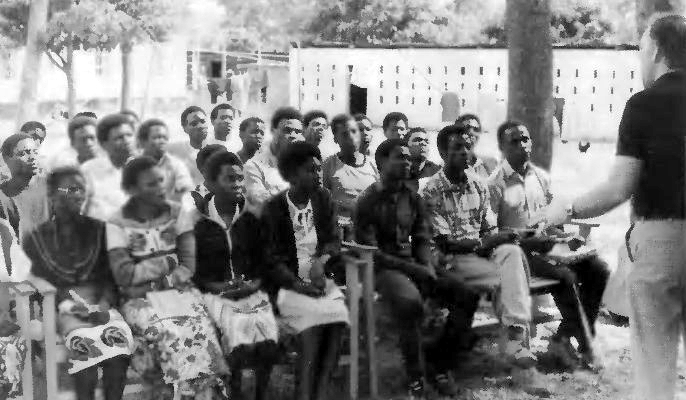
George
Glass addresses members attending a 21-day training in Luanshya,
Zambia.
To be sure, there is a wild side to each of these places. But the visitor finds that much has already been tamed, and that there are numerous ongoing development projects throughout each nation.
Our missionaries have been working diligently for more than ten years in Africa. The Principle has been taught all this time in each of the nations I visited. As a result, these countries now have numerous members, some living in centers and others in home church areas -- all of whom are engaged in a variety of projects in addition to their witnessing and teaching activities.
Among the most prominent of the programs being conducted in African nations by Unificationists are farm projects. These were formed in response to the encouragement of our True Parents and Rev. Kwak, who have stressed that until Africa can feed itself, greater development cannot really take place.
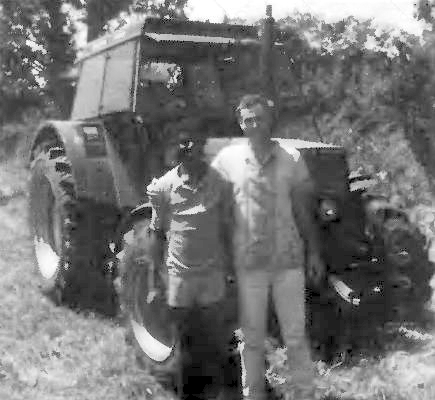
Remy
Blanchard and brother Alfredo, farm manager at Kibutu Farm I in
Zaire.
Another image of Africa prevalent today is that poverty and starvation are widespread because the land is unable to support the population. When one visits and sees for oneself the richness of the land and the potential for development, one is shocked that there could be starvation anywhere in Africa. In each of the countries I visited I saw that each family routinely has its own small land area on which it grows its own food. Garden plots can be found here and there throughout the bush, each one with its own carefully tilled and successfully planted crops. Generally these plots are farmed by women who do this task in addition to bearing and rearing children and attending to household chores. There is evidence that enough arable land exists in certain areas of Africa to support not only the people of those regions, but the entire continent. Father encouraged the founding of farm projects there so that through practical experience our members could investigate and develop ways for Africa to become self-sufficient in the production of food.
Another common image of Africa is that its people are generally helpless and incapable. I found that, on the contrary, Africans are not only industrious but quite skillful in making use of whatever materials are at hand in order to accomplish any particular task. Our farm projects are a good example of this skill and industry.
In Zambia, for example, there are farms of 6, 15, 50, and 7,000 acres. The six-acre farm is used for the rearing and breeding of pigs. Currently the farm has nearly 40 sows. The members there grow much of their own feedstock as well.
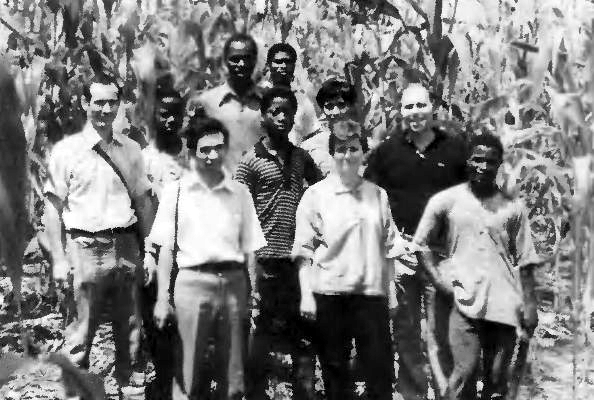
Missionaries
Lionel Ader and Teruo Aritani, IRFF nurse Arlette Beatty, and George
Glass join farm manager Mermoz and staff members at Sanepa Farm in
the Ivory Coast.
A six-month training program has been developed on the 15-acre farm to teach students various techniques of organic farming. It is hoped that this farm can become a government-recognized agricultural school in the future.
The 50-acre farm is used to grow a wide variety of crops, while the 7,000- acre farm is currently being developed for extensive cattle raising.
In Uganda, 80 acres of land in a very fertile area near the city of Jinja have been donated to the use of our church there; the land is to serve as a model farm for the education of local people. Our members are currently building a school on a portion of the land so that villagers and farmers from the area can receive basic education from our brothers and sisters.
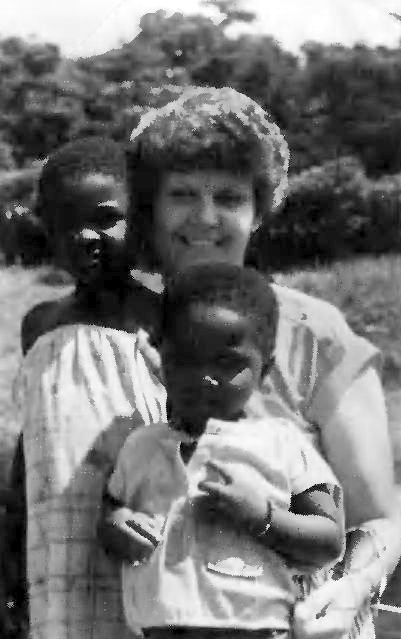
Kathy
Harting Rigney and Mermoz's daughters in the Ivory Coast.
In Zaire there are several agricultural projects. In the Kinshasa area, on the western side of Zaire, there are three farms. One is being developed specifically for the raising of chickens, pigs, and fish. Another is for the growing of maize. The third farm is a special project of graduates of the ECOPROF program sponsored by the International Relief Friendship Foundation (IRFF). Brothers and sisters there are working and living with people in a medium-size village near Kinshasa. They are utilizing techniques learned at ECOPROF to dam and structure a small stream into about a hundred fish ponds for the cultivation of fish. The fish provides protein needed in the local diet. The members have also established a school in the village for the training of village children.
In eastern Zaire three farms have been established in the mountainous region just north of Goma. This area is some 4,000 meters high and is extremely rich in volcanic soil. Our farms there have just begun producing their first crops.
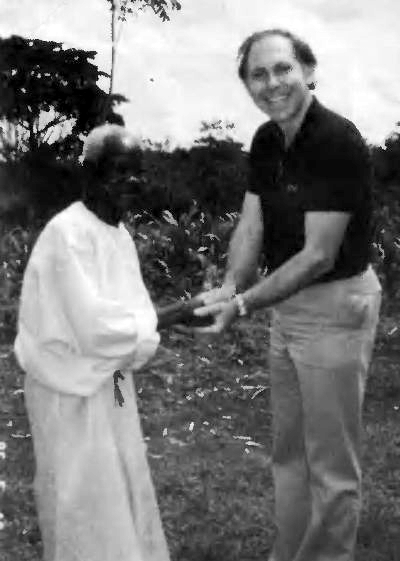
M'ze
Obadiah, owner of the 80 acres near Jinja, Uganda, greets George
Glass. M'ze is donating the land to our church.
In the Ivory Coast members are developing farm projects at several sites throughout the country. In Sanepa, for example, members are also working and living with villagers on land donated by the local chief. They farm maize and rice especially for that village.
From my observation, it appeared that there is ample arable land in the countries I visited. And people -- especially our brothers and sisters -- work very hard and very diligently on their land to produce what they need. The problem of starvation in Africa is due more to a lack of processing and storage facilities and inadequate distribution.
To be sure, the countries of Africa have all achieved their independence just within the last 25 to 30 years. In many cases roads, means of transportation and communication, governmental organizations, and trading links were almost non-existent when the countries gained their independence. In all cases a colonial system was inherited which had promoted the development of cash crops that may have been useful for the imperial "mother countries," but did little for the indigenous peoples once they were independent. (The "mother countries" often designated entire nations to harvest one crop, each nation being appointed a different crop. The harvests were traded with the mother country alone.)
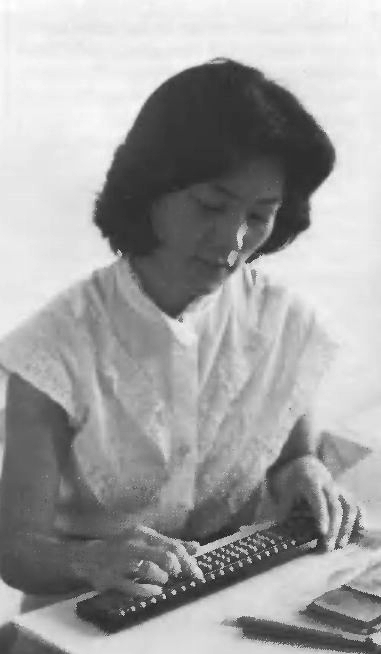
Tomoko
Otika, blessed to Ugandan brother Raymond Otika, does some
calculations on her abacus.
Intra-African trade must still be developed as a result. Roads are being built to promote this, but many more are needed. Communication systems must be improved. Electricity still has not reached a great many areas, although the harnessing of many powerful African rivers has made electrical power quite inexpensive. Most importantly, cold storage and processing techniques need to become widespread. All these things are happening everywhere I visited -- to a degree. Much more will be done as time passes. The fact that our brothers and sisters have initiated these agricultural programs based on True Parents' inspiration has enabled them to actually see for themselves how Africa's great potential can be developed by Africans themselves. Farming is just the beginning of the cycle.
In the area of food processing, the sausage business started by members in Zambia to support the mission there continues to expand. Currently more than 30 cows and 100 pigs are being used each week, and, in spite of the fact that members work day and night shifts every day, the factory is still unable to keep up with the demand for its products. The sausage factory in Zambia is also serving as the training site for brothers from other nations of Africa. These brothers are completing their training one by one and returning to their own nations to establish similar enterprises. Members have already begun producing sausage in their factory in the Kinshasa region of Zaire. More factories will be created in the near future in other countries.
In Zambia and the Ivory Coast, members have already opened small stores in downtown areas to sell their sausage and produce.
Although we have focused largely on farming in this article, it is important to note that members are also diligently engaged in our normal witnessing and teaching programs. Additionally, many social service programs have been founded to assist local people.
In nearly every country there are trained medical personnel available through IRFF. One team has just returned to Zambia from several weeks of volunteer work among the refugees in the Sudan. Dr. Yasufumi Takigawa led this team.
In Zambia, final construction work is being completed on a beautiful clinic built by our church members on church land with church funds. This facility will be donated to the Zambian government.
Two European nurses are working in the Ivory Coast representing IRFF. They work in conjunction with a nationwide program there, assisting women who are either pregnant or have recently given birth.
Many of our farm projects throughout Africa also have small first aid facilities for local villagers.
In addition to medical work, schools offering primary and secondary education are being initiated and staffed. A good example of this is the Chilenje School in Lusaka, Zambia.